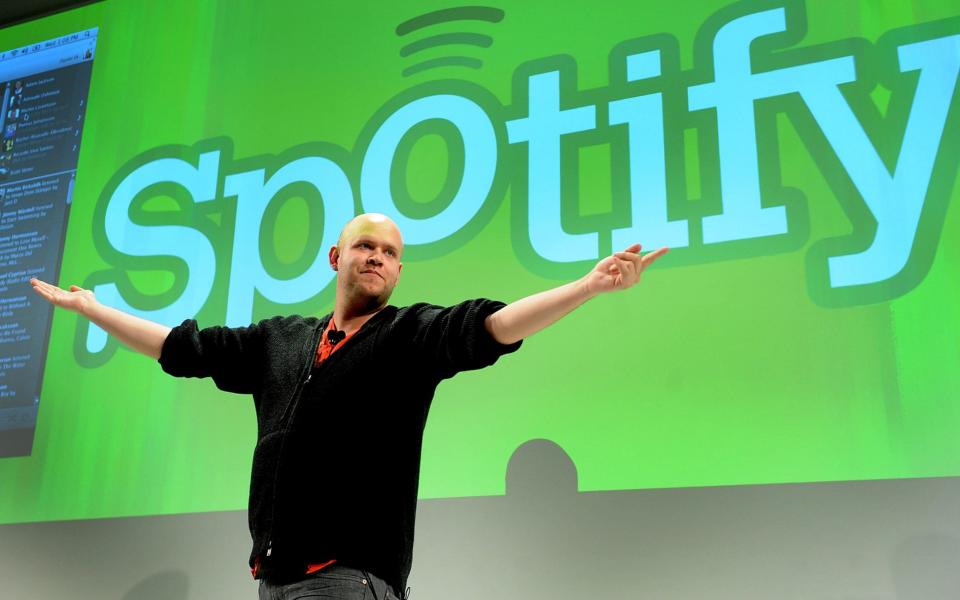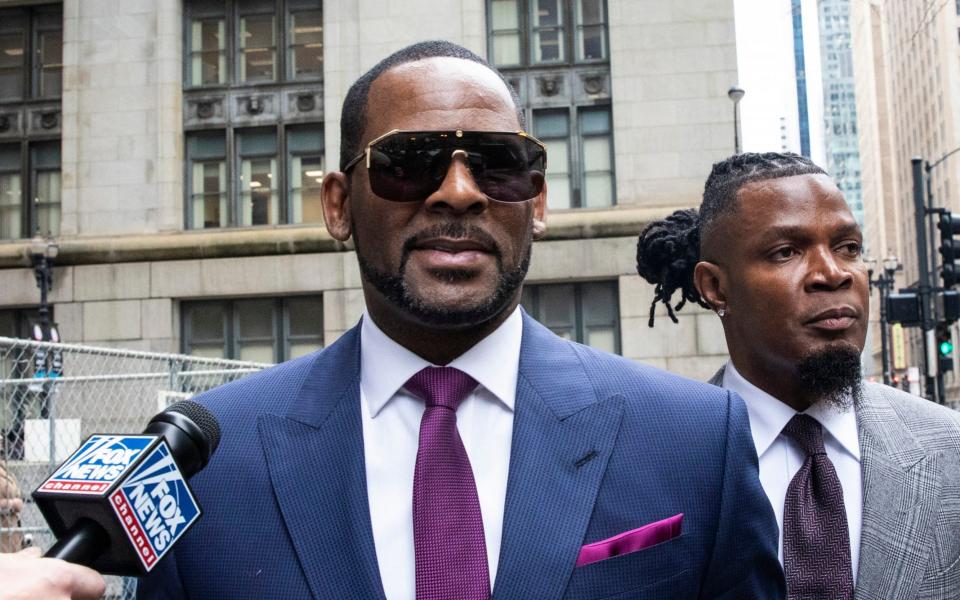Spotify's grand plan to turn podcasts into riches

Joe Rogan is an unusual kind of kingmaker. A comedian who is fond of smoking cannabis in his studio, his anarchic podcasts have inspired great loyalty among millions of otherwise disenchanted young men.
His influence has buoyed the campaign of US presidential hopeful Bernie Sanders and wiped more than $3bn (£2.3bn) from the market capitalisation of Tesla.
His latest beneficiary? Spotify, whose value jumped by $1.7bn in 23 minutes after announcing that it now had exclusive rights to Rogan's output in a $100m deal.
But Spotify isn't stopping with Rogan. The company has also signed up Michelle Obama, Kim Kardashian West and the seminal documentary show This American Life.
Meanwhile, Spotify is developing its own targeted advertising infrastructure to make podcast promotions as precise, and therefore lucrative, as Facebook's or Google's – a long-awaited milestone that could both galvanise and upend the industry.
All these efforts seem to be paying off. On Wednesday, the Swedish music streaming service announced that it has 299 million monthly active users, a 29pc increase from the second quarter last year. It also reported revenues of €1.89bn, a 13pc year-on-year increase.
The number of users listening to podcasts increased to 21pc from 19pc, but the amount of podcasts they consumed almost doubled. "Overall, podcast advertising outperformed in the quarter with momentum continuing into July," the company said.
The podcast wars
Spotify's competition with Apple, Google and smaller, dedicated audio firms such as Stitcher has sometimes been called the "podcast wars".
But one and a half years on from its eye-catching acquisition of the Gimlet Media, a major podcasting studio, it's not clear there's much war left to fight. Or, as one studio boss quipped after the Rogan deal became public: "Game, set and match."
"Apple was the place people listened to podcasts, until just a couple of years ago," says Joseph Evans, head of tech at Enders Analysis. "But they were asleep at the wheel, and didn't do anything to grow the market, give podcasters the tools they wanted ... or defend their position at the top of the pile.
"Probably podcasts were just too small to worry about for a company making a quarter of a trillion dollars a year. But that carelessness has allowed Spotify to challenge Apple for the top spot."
With 138 million paying subscribers compared to Apple Music's 60 million, Spotify has plenty of listeners who could be lured into its new offerings.
Exact figures are hard to come by, but Evans says that Apple is still ahead in the US, while Spotify beats it in markets where Android smartphones are the norm.
The Swedes' biggest asset, however, is their willingness to abandon the basic technology which has both sheltered and restricted the podcasting industry for almost two decades – something Apple has not yet been willing to do.
Traditionally, podcasts have been distributed via a system called RSS, in which apps such as Apple Podcasts simply list and direct users towards audio files that are hosted elsewhere.
That has made the technology fairly incredibly open and difficult to censor, preventing it from being swallowed by large companies. Yet it has also winnowed its revenue by blocking the sophisticated targeted advertising common in other media industries.
“We still think the industry as a whole is vastly under-monetised – year over year, the level of podcast creation and consumption continues to outpace monetisation,” said Joel Withrow, a senior product manager of podcast monetisation at Spotify.
A data goldmine
By contrast, Spotify podcasts are hosted and played entirely within Spotify's service, allowing it to know exactly who is listening, how long they are listening and where they stop or skip. The company can easily insert personalised adverts at any point rather than forcing hosts to pre-record them into the podcasts themselves.
"Right now, most podcasts don't make any money from advertising, because they aren't big enough to sell ads directly to an agency," says Evans. "But Spotify could aggregate podcasts and sell to advertisers based on who's listening, rather than what they're listening to, and make podcast advertising work more like ads on the web."
In January, Spotify announced a suite of new advertising tools for podcasts which will hand information such as listening statistics, age, gender, and device to podcast hosts and advertisers paying for promotions in episodes. Its hope is that making this information available could drive up the rate charged for podcast ads.
Withrow has described a "virtuous cycle" in which the new tools "pull more revenue into the industry" and therefore makes it more attractive to new podcasters.
And so the plan emerges – fiendish in the eyes of some podcast fans, but fairly simple.
After a period of initial spending to get stars on board, its listenership will grow large enough, and its advertising system lucrative enough, to the point where other podcasters cannot afford not to use it. That would give it as much power over podcasts as Facebook has over news publishers.
But the path ahead is not without obstacles. The coronavirus pandemic caused listener numbers of some podcasts to drop as much as 30pc.
Podtrac, a podcasts analytics business, warned in April that it had seen total unique listeners drop 20pc since the beginning of March as many listeners worked from home and stopped listening to podcasts during their commutes.
And many industry experts have expressed their discomfort at Spotify ending the previously open world of podcasts available on hundreds of different apps.
“Most likely, this deal will come to symbolise the moment when the open, RSS-based podcast ecosystem began to collapse,” wrote Product Hunt co-founder Nathan Baschez following the announcement of Spotify’s deal with Rogan.
"If there are any big holdouts among popular podcasters, who maybe don't like Spotify's closed ecosystem, or who sign exclusive deals with other players, then Spotify can't present itself as a one-stop-shop, and podcast listening could become fragmented across a number of apps," says Evans. "Some people even refuse to call what Spotify is offering 'podcasts'."
And if Spotify does succeed, it may struggle to govern its new conquests. In the past, it has largely been able to avoid the censorship debates and toxic speech scandals that have dogged the likes of YouTube, Facebook, Twitter and TikTok since their beginnings.

There are exceptions, however. Spotify pulled music by R Kelly and XXXTentacion from its curated playlists in 2018, citing a new “hate content and hateful conduct” policy. Their music remained available on Spotify, but the service reduced their potential reach by hiding their albums from its influential playlists.
Spotify's decision was later reversed following a backlash by music labels, showing the difficult task of attempting to create moderation policies from scratch.
But disputes over music and lyrics are nothing compared to the headaches that will arise from the news programmes, political debates and fringe soapboxes that will soon fall into its bailiwick.
Rogan in particular is popular but highly controversial. An endorsement by Rogan of Bernie Sanders in January generated criticism online from people who accused Rogan of previously making transphobic comments and interviewing conspiracy theorists such as Infowars host Alex Jones.
Rogan has denied the accusations and said they were based on a clip that was "completely out of context."
"If there are some trans people listening to this, I've got nothing but love for you, for everybody," he added.
The company will be especially vulnerable to such blow-ups during this opening phase of its campaign. Until it attracts enough listeners to grow via Facebook-style network effects – that is, everyone uses it because everyone is using it – it will have to rely on big names.
Stars like Rogan could become Spotify's version of PewDiePie, the YouTube star so big that he still secured an exclusive contract after years of racism accusations, which he has consistently denied.
Moreover, the old RSS system gave podcast services only limited powers of censorship - and therefore limited responsibility. Though companies have "delisted" podcasts in the past (most notably the Infowars podcast featuring Jones), even giants like Apple had no control over the content itself, whereas in Spotify's walled garden the buck will stop with Ek. So the same centralised control that enables its advertising gold mine is also a PR time bomb.
